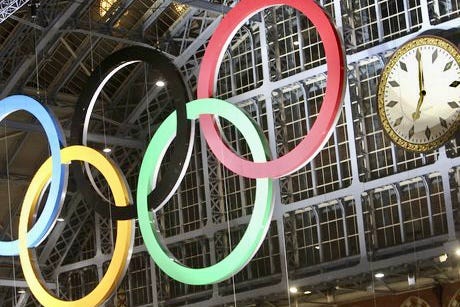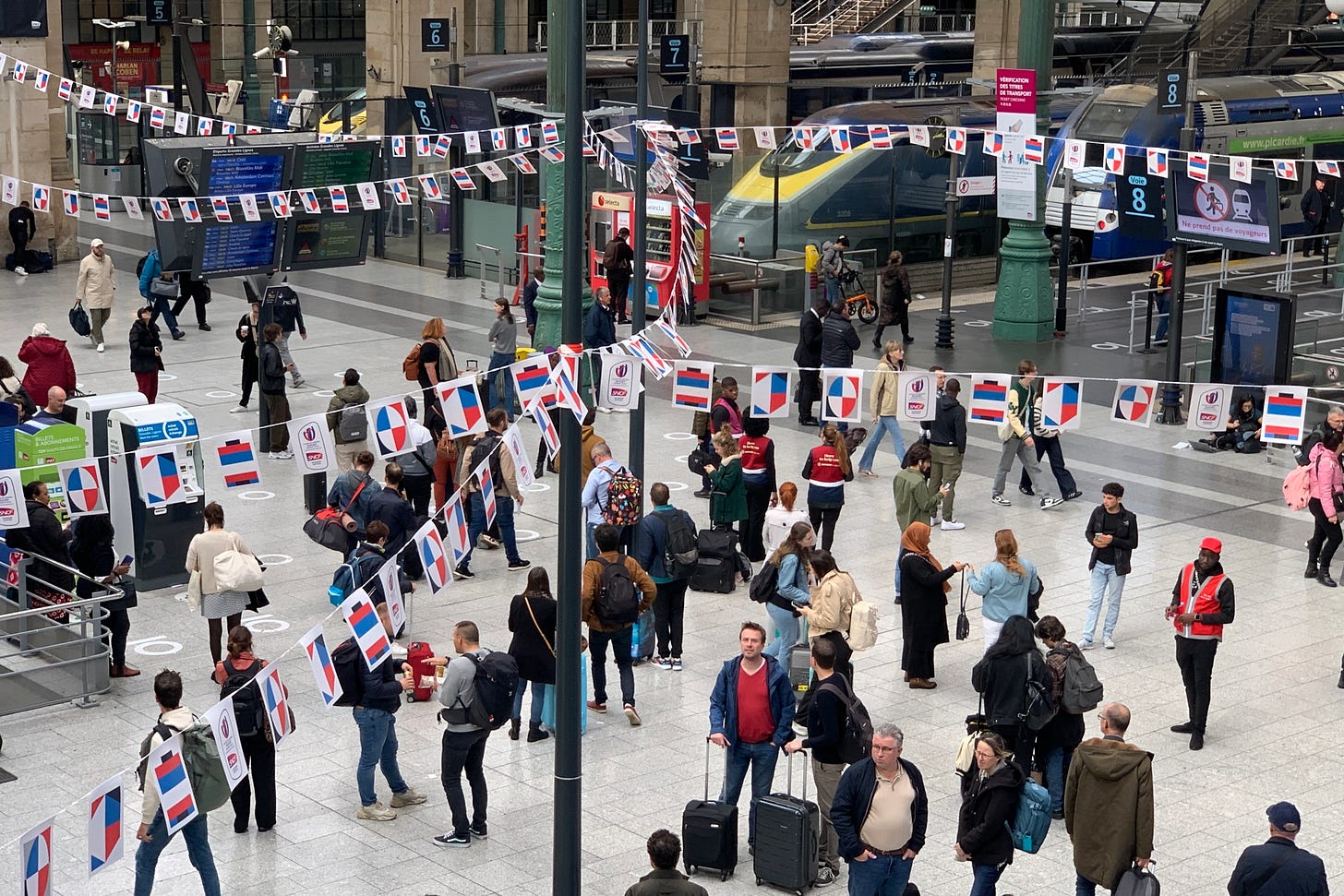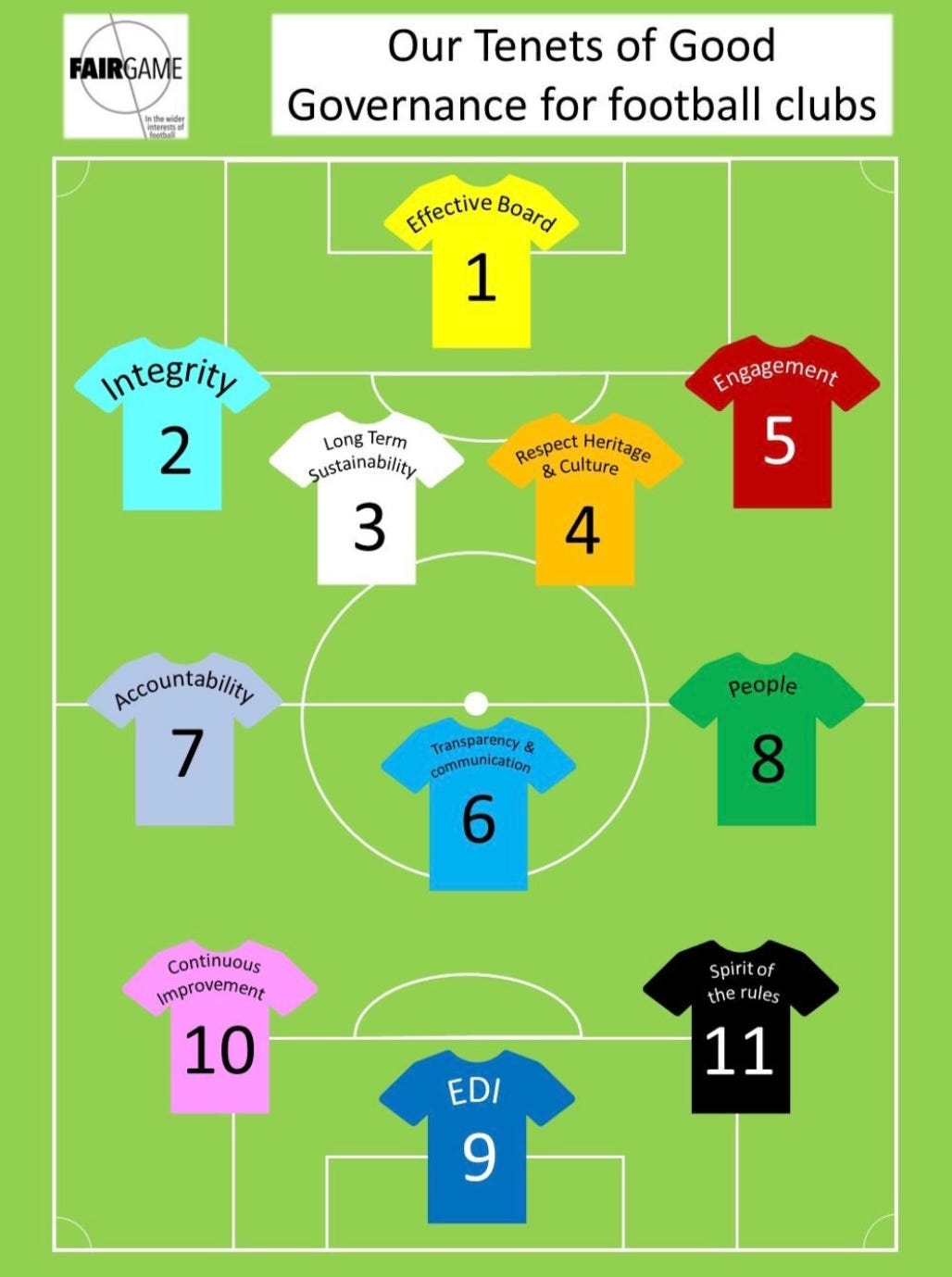They’ve hung out the bunting at Gare du Nord. Strings of rugby ball inspired pennants to greet fans stepping off the Eurostar for the World Cup. The departure lounge features a few red, white and blue baguette balloons Sellotaped to a window and a string of flags dangling from a blank flatscreen tele. Not so much global sporting gala as village fete. And all around Paris, on Metro and roadside, you’ll see Tezenis lingerie ads, but barely a glimpse of World Cup sponsors.
I was in the French capital last week for the International Wheelchair Rugby Challenge, a competition for the world’s top eight nations to coincide with rugby union’s flagship event. A last chance for countries to test themselves against the opponents they are likely to clash with at next year’s Paralympics. An opportunity too for organisers to assess their own readiness for Paris 2024, just as the RWC itself is being seen by many as a gauge of France’s big event hosting abilities.
World Rugby, I’m told, is frustrated at the lack of visibility generated for its event, especially in Paris. The tournament has felt made for TV - the sight of some empty seats aside - but has failed to capture the imagination of the capital city, let alone the nation. In my short visit I soon lost count of the number of times I was told that it would be different next year.
It will of course be different. Paris can absorb a few thousand visiting rugby fans. Hotel room rates barely blipped. Our Eurostar may have been packed with supporters and the occasional journalist in search of a colour piece - The Frog & Rosbif pub already loaded into Google Maps - but the train home on the eve of England’s semi final was just as full. This, like London, is a tourist city catering week-in, week-out for travellers of all motivations, sporting or otherwise. The scale of the Games, however, is something else entirely.
You might wonder why billboards and lamppost banners matter if an event is sold out. Public awareness goes to the heart of the compact between rights holders (the international federations, such as World Rugby, the IOC and the IPC who own events) and the governments and cities that provide them with a temporary home. The former understand the value to sponsors of enthusiasm among the populace that extends well beyond those who have a ticket or are just prepared to spend hours in front of a TV screen; the latter want their locals feeling good and the wider world seeing a city or nation in its best party clobber.
"Rugby fans all over the world know about our French Flair. This year, in 2023, we will show our French Share: our art of sharing, conviviality and fraternity." President Emmanuel Macron at the RWC opening ceremony
The cost of dressing a city for a big event falls largely outside the budget of the host organising committee. It may pay for some branding to help shift tickets and lure in sponsors, but tends to look to local politicians to conjure bunting funds from constrained municipal budgets. Tensions often run hot as rights holders demand a higher event profile from organisers who in turn beg the city authorities to deliver.
Sitting in the middle of the petty squabbles that often ensue - as I have done - can be the most irritating experience. Only by reminding yourself of the motivations of rights holder and host can you survive without blowing a gasket. Important to remember too that you may want to drink at the same well for a future event, so best try not to lose it.
With this in mind, I was as much on the scout for evidence of Paris 2024 promotion as RWC 2023 last week. I wouldn’t be surprised given the dearth of signage if the IOC was already pressuring the Paris organising committee (COJO) to do more, and fast. The proof is in the continued availability of Olympics tickets for a wide range of sports and both opening and closing ceremonies. Paralympics tickets went on sale a couple of weeks ago and are plentiful and decently priced. No news on uptake, but the rumours are that it has been sluggish so far. Little awareness equals few sales.
COJO has much to worry about, most of it Games business-as-usual, but the small matter too of raids on its offices, and the home of its CEO, by financial prosecutors (PNF) looking for evidence of possible favouritism in the awarding of contracts. While no criminal charges have been laid, perhaps corruption allegations have now simply become part of Games BAU - witness Rio and Tokyo to name but the two most recent host cities. Big one-off contracts that must be delivered to tight, immovable deadlines…
"Paris 2024 confirms that the PNF attended its headquarters on Wednesday, October 18 and obtained all of the information that it asked for. Paris 2024 is cooperating fully with the investigation as it has always done.” COJO statement
As I disembarked at St Pancras International on Friday evening I looked up at the station clock and in my mind’s eye could still see the huge Olympic rings and Paralympics’ Agitos symbol that hung in front of it in 2012. Eurostar tickets for next summer go on sale early next month.
Fine margins, few tickets
One sport that is almost sold out for the Paras is wheelchair rugby, helped no doubt by last week’s IWRC and a venue in an iconic Champ de Mars location close to the Eiffel Tower. Matches typically see around 100 tries scored between the two teams. The average margin of victory in the knockout stages at the IWRC was just 3.1. Britain finished fifth having lost to the two finalists by just one and two tries. Fine margins indeed. All teams have all to play for. Here’s a link to the ticket website
All aboard!
I’ll admit I may have a blind spot where football governance is concerned, so scarred am I by experience of the poor performance of regulators in other industries. The establishment of an independent regulator for football is getting closer though, and with it I fear an overload of costly bureaucracy that still fails to prevent the occasional club implosions that are laced through the rhetoric of those calling for an overlord.
Fair Game, leading advocate for regulation, has just published a suggested Code of Governance for Football Clubs in England with eleven tenets (none on the subs bench) as shown in its schematic above. Having ploughed through the detail I’m left with the impression of a gilded lily. Certainly there is more than enough here to keep a phalanx of bureaucrats busy administering the Code. No wonder the Premier League continues to argue against independent regulation.
“Each of our 11 tenets is vital to the future of the game. Enshrining them in how the game runs will help eradicate the heartache that comes when a club collapses, at the same time as giving proper structure to the owner-fan relationship.” Fair Game
The lobbyists flag one item they know is contentious - a stipulation that each board has two directors elected by supporters, preferably one of each gender. That way chaos lies.
But I may have a blind spot. You can read the strawman Code here






